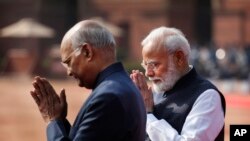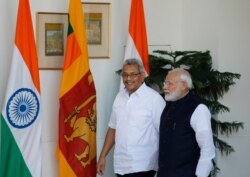India has offered to lend $400 million to Colombo for infrastructure development as it reaches out to build ties with Sri Lanka’s newly elected president, Gotabaya Rajapaksa, who is visiting New Delhi.
Rajapaksa’s meetings Friday with Indian leaders, less than two weeks after he took power, signal an effort by both countries to reset a relationship strained during a previous term when he and his brother dominated Sri Lankan politics and took the country closer to China.
India and China have been competing for influence in the tiny island country located off India’s southern tip that has seen an influx of Chinese investment in the last decade. New Delhi was particularly perturbed when Chinese nuclear submarines docked at Colombo harbor in 2014 when Gotabaya Rajapaksa was defense secretary and his brother was the president.
Following talks with Indian Prime Minister Narendra Modi, the Sri Lankan leader appeared to assuage those concerns telling reporters that “we will continue to work closely with India to ensure that the Indian Ocean remains a zone of peace.”
“I want to take ties with India to a very high level,” Rajapaksa said following a welcome at the presidential palace in New Delhi.
In the aftermath of deadly suicide bombings that killed more than 250 people in Sri Lanka this April and raised concerns that Islamic militant groups were spreading their influence in South Asia, both leaders also stressed that they will step up cooperation to tackle terrorism.
“We have had to rethink our national security strategies, and assistance from India in this regard will be most appreciated,” the Sri Lankan leader said Friday.
Announcing a $50 million credit line to improve security in Sri Lanka, Modi said that India is already providing counterinsurgency training to Sri Lankan police officers.
Analysts point out that it remains to be seen how the new president will balance ties between India and China.
Beijing has invested billions of dollars in Sri Lanka in a string of infrastructure projects, from oil refineries and highways to a strategic port that it now operates. It sees the tiny island country, which lies close to key shipping lanes, as a key link in its Belt and Road initiative.
Analysts point out that India cannot match Chinese investment that has helped Beijing spread its influence in New Delhi’s neighborhood, but will have to rely on boosting trade links and strengthening cultural ties with Sri Lanka to build goodwill.
That is the message Modi sought to give Rajapaksa saying that “India is fully committed to the development of Sri Lanka.”
Since becoming prime minister in 2014, Modi has stressed a “neighborhood first” policy, hoping to offset China’s growing influence by holding out the promise that its small neighbors will benefit from its much bigger economy.





